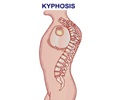
Is Unstable Spondylolisthesis Really Unstable The researchers analyzed the "natural history" of cervical degenerative spondylolisthesis in 27 patients. Degenerative spondylolisthesis refers to "slipped" vertebrae caused by bone degeneration. Because spondylolisthesis is commonly thought to result in instability of the cervical spine, spinal fusion surgery (arthrodesis) is sometimes considered the appropriate treatment.
The 16 men and 11 women in the study underwent cervical spine radiographs (x-rays) on two occasions at least two years apart. The patients' average age at the time of the initial radiograph was 59 years; average time to the follow-up radiographs was 39 months. Measurements on the paired radiographs were carefully compared to determine whether and how much the cervical slippage increased over time.
Initial x-rays showed "instability"—at least two millimeters of displacement between vertebrae—in several patients. However, during follow-up, none of the patients had further progression, defined as additional displacement of two millimeters or more. The average progression was only about one-half millimeter.
Twenty-one patients had backward displacement ("retrolisthesis") of the cervical vertebrae, while six had forward displacement ("anterolisthesis"). The patients with retrolisthesis had somewhat greater slippage during follow-up; however, none had a dislocation or suffered neurological damage.
No Progression of 'Slippage' or Symptoms Of 16 patients who had symptoms such as neck pain or sensory abnormalities at the initial visit, most were successfully managed without surgery. Of the 11 patients who were initially symptom-free, none developed symptoms during follow-up.
Advertisement
The researchers acknowledge some important limitations of their study—particularly the small number of patients and relatively short follow-up. However, the results suggest that, for many patients, cervical spondylolisthesis is a non-progressive condition that does not necessarily require surgical treatment. Dr Park and coauthors conclude, "In the absence of neurologic symptoms, we recommend observation of patients with degenerative spondylolistheses of the cervical spine."
Advertisement
Source-Eurekalert












